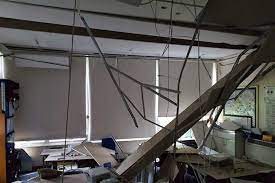Following their summer break, British parliamentarians returned to the House of Commons on Monday. However, because of the danger posed by collapsing concrete, thousands of British students won’t be going back to school this week.
The news is a challenge for Prime Minister Rishi Sunak at the beginning of his tenure as he struggles to boost waning support for the ruling Conservative Party ahead of a general election the following year. Sunak maintains that it is not his fault that more than 100 schools were instructed to close part or all of their facilities last week, just days before the start of the new school year, since they contain a light-weight, air-filled concrete that was frequently utilized in construction between the 1950s and the 1990s. Following the government’s last-minute decree, which was spurred when three schools that were deemed safe collapsed during the summer, school administrators are scurrying to find classroom space in adjacent establishments or turning to online education.The “vast majority” of schools, according to the administration, are unaffected by issues with reinforced autoclaved aerated concrete. The substance, known as RAAC, is cheaper, lighter, and weaker than conventional reinforced concrete, with a usable life of roughly 30 years. The entire number of affected schools, according to the administration, is probably in the hundreds, but not in the thousands. Sunak told broadcasters, “I know the timing is frustrating, but I want to give people a sense of the enormity of what we are grappling with here. The crucial thing to know, is that we anticipate that 95% of the 22,000 schools in England won’t be impacted by this. The opposition sees collapsing schools as a metaphor for the plight of a nation they call “Broken Britain” as a result of cost-cutting in the public sector during 13 years of Conservative control. When Education Secretary Gillian Keegan was overheard complaining about drawing attention to the actual issues, the sense of crisis intensified. She asked: “Does anyone ever say, You know what? You’ve done a good job because everyone else has sat on their bottom and done nothing?” after an interview with the British television network ITV. She used harsh profanity before “good.” Within an hour, the video had millions of social media views. After apologizing for her “choice language,” Keegan expressed her frustration at the interviewer’s portrayal of her as the sole culprit.
The government should share some of the blame, according to critics. Jonathan Slater, a former senior civil servant in the education department, claimed on Monday that Sunak had drastically reduced the number of schools that needed to be renovated from 100 to 50 while serving as Britain’s Treasury head in 2021. Slater claimed that the number ought to be between 300 and 400. That accusation, according to Sunak, is “completely and utterly wrong.” According to him, renovating around 50 schools a year was consistent with what previous administrations had done. RAAC was used in settings besides schools. Aerated concrete was also used in the construction of courts, hospitals, and other public buildings, frequently for roofing.
Bridget Phillipson, a spokesperson for the Labour Party on education, said that the government “still isn’t being upfront about the scale of what we are facing” and that “ministers need to get a handle on this.” After Liz Truss, his predecessor, upset the economy with a plan for significant, unfunded tax cuts, Sunak won office 11 months ago, promising to restore stable governance. The school situation adds more unwelcome drama to Sunak’s life. Sunak is already having trouble keeping his five major commitments, which include halving inflation from its peak of 11% by the end of the year (6.8% in July) and reducing the number of migrants travelling to the UK in small boats across the English Channel. With an election scheduled for the end of 2024, polls show the Conservatives to be up to 20 points behind the Labour opposition.
Despite having a lead in the polls, Labour leader Keir Starmer is criticized for his uninteresting, lawyerly style of politics. Left-winger Jeremy Corbyn, who guided Labour to two electoral losses, was replaced by Starmer in 2020. The political middle ground that the party occupied under former Prime Minister Tony Blair has been attempted to be reclaimed by Starmer. Although Blair is the most successful leader of Labour, having won three straight elections beginning in 1997, he is nevertheless seen negatively by some members of the party for weakening the socialist principles of the party and supporting the 2003 war in Iraq. In an effort to form a government-in-waiting to contest the next election, Starmer moved to strengthen his position by reorganizing his top team on Monday. He supported a number of conservative legislators, including Liz Kendall, Peter Kyle, and Pat McFadden.
Angela Rayner, the deputy leader, received a promotion that gives her additional responsibility for “levelling up” and addressing the massive economic and social disparities in Britain. Rayner, a former ally of Corbyn who is well-liked among party activists, is regarded as a valuable stylistic and vocal complement to Starmer. I’m incredibly happy that after changing the Labour Party, we are now able to present the country with our best team, Starmer added. “I’m thrilled that we now have such a strong team on the field,” said the player.

















